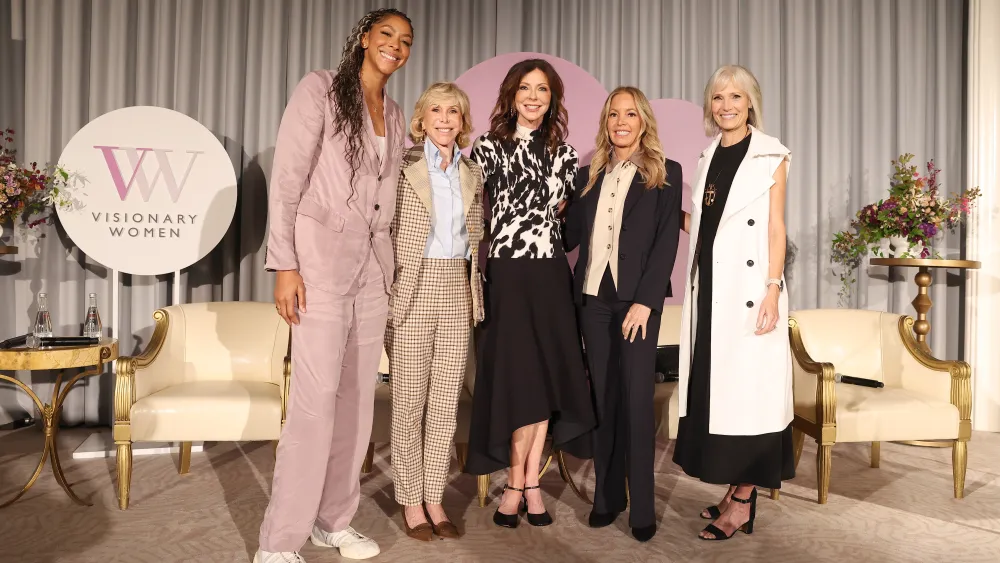
Los Angeles-based nonprofit social impact organization Visionary Women celebrated its 10 anniversary Oct. 8 with the Visionary Women’s Summit at the Beverly Hills Hotel.
The org, dedicated to the advancement and empowerment of women and girls, honored philanthropists Bridget Gless Keller and Carolyn Clark Powers. Over the past decade, Visionary Women has granted more than $4.2 million to some 280 nonprofits that champion women and girls.
The morning kicked off by a uplifting performance from the all-female Raise Choir. Reshma Saujani, CEO of Moms First, founder of Girls Who Code and host of My So-Called Midlife, was awarded the Visionary Prize for Women’s Economic Empowerment, which came with a grant of $100,000 for her nonprofits. She spoke about the need for women to empower women: “So here’s my challenge for you today. I want you to think small but mighty. So before you leave here today, I want you to pick one thing, one concrete thing that you can do to close the distance between a woman’s talent and her opportunity.”
Soccer superstar and entrepreneur Alex Morgan was honored with the Changemaker Award. Morgan also was featured in a special conversation about pay equity.
The summit also included the panel “Breaking Barriers: Female Owners Changing the Game,” moderated by former WNBA star, Olympic gold medalist and sports broadcaster Candace Parker. Panelists include Willow Bay, owner, Angel City FC, Jeanie Buss, governor and co-owner of the Los Angeles Lakers, Charlotte Jones, chief brand officer and co-owner of the Dallas Cowboys, and Lauren Leichtman, owner, San Diego Wave FC.
Parker opened up about a memory she had when she was in middle school as a player on an undefeated (for two years!) basketball team: “Our uniforms were old and dingy, and I looked at the boys who won like, three games, and their uniforms were brand new. And then I fast forward, and I’m on TNT with the guys, and everybody’s like, you’re trying to be one of the guys? And I’m like, No. I’m just trying to be a woman in sports that has a different point of view. I think all of us can relate to the barriers that we face entering women’s sports as a woman in sports, playing sports, ownership.”
Bay noted, “I think we all unsure, quite confidently sure that we all have litany of stories of barriers and obstacles. You know, I’m from a generation that just assumed that was the cost of doing business, and I love that today’s generation of women is having none of it.”
She added that “the barriers that I see today, I think, are still outdated notions of what women’s sports is — that it’s a smaller, less valuable version of men’s of men’s sports, when that is so clearly not the case.”
Parker recognized that Buss, as the first female governor in the NBA is also the first woman to win a championship, but Buss said that the first thing she thought of was who was going to be next? “Women belong in sports, in business, women’s sports, men’s sports. I think my biggest challenge was I couldn’t develop relationships with the players like my father could, because I couldn’t go in the locker room after a game, and I had to figure out ways to make connections with the players that were meaningful outside of going in right after a game to the locker room. I think about my relationship with Kobe Bryant, and how a friendship and really important relationship in my life came to be. And so it’s just figuring out how to do things your way. You don’t have to follow in the exact footsteps or a formula in finding your way to be successful.”
Jones talked quite passionately about being brought into the Cowboys organization by her father, Jerry Jones, and how they navigated making sweeping and many times unpopular decisions. “you have to be strong enough to face all of the criticism that goes with that. I mean, let’s face it, you’re stepping into the highest visibility of any kind of business, of everyone is interested, and everybody has an opinion, and everybody thinks they can do it better than you can. So that’s kind of just part of it. That toughness, that resilience, that’s why I think our game is so great, because that’s the greatest part of our game, it teachers perseverance and determination, like getting knocked down and getting back up.”
She added: “I think it is so relevant to the group in the room that although we are in a very male dominant sport, 47% of our fan base is female. So if you do not have a female voice at the table, how are you going to reach half of your business?”
All panelists are working for a time when it’s just sports, not women’s sports. “It doesn’t matter the gender of the sport at the player of what we’re watching. It’s about sports. Because the beauty of sports is that it brings people together,” said Jones.
Buss invoked her mentor Billie Jean King, and King’s passionate campaigning for Title IX and its impact on equality for women’s sports, and how that must be protected, which drew much applause.
“I have invested in creating opportunities for women in sports. I have the only all-female wrestling league called WOW, women of wrestling. It’s in syndication. I got involved in that because there’s so many athletes that graduate after their college eligibility is done. What can they do to earn money? We teach them how to wrestle — field hockey players, swimmers, whatever, great athletes are great athletes. You can teach them to do anything, let them perform. So we just need to continue to invest in youth female sports, keep the women participating.”